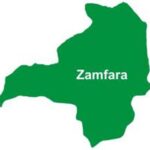By Ambassador Kabiru Bala
On 1st October, 1996, six additional states were created amidst elation and jubilation by the people across the new states as it brought about the actualisation of a longstanding dream of the majority of the population of the new states.
Zamfara State was one of the newly created states. With its creation, the people felt that development would naturally ensue more freely than before. The optimism that greeted the creation of the state after so many years of agitation has now given way to disillusionment as happenings in the state are far from the dream, vision, mission and aspiration of the people, the leaders and its founding fathers. It is now fair to say that banditry, kidnapping and general insecurity and the gradual appearance of the phenomenon of Internally Displaced Persons (IDPs), out of school children, appear to define the character of the state.
- How B/Haram crisis killed 300,000 children in N/East
- Amilcar Cabral, Abdulrahman Babu and the future of Africa
This year alone, the state has witnessed the declaration of no-fly-zone and a ban on mining activities to curb the rising insecurity in the state. The students of GGSS Jangebe were abducted as were some teachers and students of College of Agriculture, Bakura, and the students of GDSS, Kaya, in addition to the other abductions, kidnappings and killings in previous years.
In response, the government has taken measures to arrest the deteriorating insecurity including, among others, the dethronement of some traditional rulers; district heads for alleged complicity in the insecurity. Boarding schools have been converted to Day schools, schools have been closed, weekly markets have also been suspended and the sale of petroleum has been restricted to specific locations. A curfew of some sort was imposed to restrict movement of certain types of transportation and movement of persons and goods within a specified period.
Military actions have also been ordered and carried out by the armed forces. Some form of truce has also been brokered by the state government with the bandits. Apparently, the truce did not hold and the bandits continue to wreak mayhem against innocent people who yearn to live normal life, against the backdrop of rising food insecurity, high unemployment, inflation, fear and looming famine.
Against this background, telecommunication services were suspended by the Nigerian Communications Commission (NCC) for two weeks, in the first instance, to enable security agencies to carry out “required activities towards addressing the security challenges”. With the shutdown on telecommunication, it will appear that all options to tackle the security challenges of the state are on the table.
It is, however, too early to assess comprehensively, the outcome of the various initiatives of the governments. Meanwhile, the people continue to suffer from the banditry and the discomfort of the measures designed to tackle the phenomenon.
It was in the midst of the ongoing security situation that a new twist was added to the political dynamics of the state in which the governor defected to APC from PDP at the end of June. The defection threw the state into some form of political doldrum. Before defecting, the governor had dissolved the Zamfara State Executive Council and boards of parastatals. He also relieved all advisers and assistants of their appointments including chairmen of all the 14 local government areas, perhaps in anticipation of the negotiations that may inevitably ensue after the decamping. Indeed, negotiations ensued between the new members of the APC and the leadership of the party the governor met at the point of his defection. Since then, negotiations have deadlocked. The stalemate in reaching an acceptable power-sharing arrangements within the APC has deprived the state of a fully constituted government effectively suited to tackle the worst crisis of the state since its creation in 1996.
Arguably, no state can fight banditry effectively without a united political front. The on-going military action, notwithstanding, political reconciliation of the political elite of the state holds more promise for a more permanent solution to the menace of banditry. In this regard, and to alleviate the sufferings of the people, it is high time that people of goodwill and good conscience took measures within and outside the state to reconcile the internal political forces to work towards the formation of an all-inclusive government that embraces all shades of opinions, wisdom and carry along, various political stakeholders and move the state away from the current stalemate and face the task of defeating the banditry ravaging it.
The foregoing short term measures notwithstanding, in the long run, to end the on-going insecurity, a concerted and conscious effort must be undertaken by all the people of the state. In this regard, a staggered blueprint that enjoys the support of the people of the state is required for its future development.
In 1996, it was reported that a blueprint for the development of the state was worked out. God knows what happened to that blueprint! Obviously, so much has happened since then. With this in mind, Zamfara State must now cast its vision and mission beyond the yoke of its recent history and forge a new future of prosperity, peace and stability.
As the banditry is rural-based, the blueprint of the state must give priority to rural development in terms of the environment, education, health and energy. To support the blueprint, the people of Zamfara State should consider aligning the state with the on-going agitation for the devolution of powers and resources from the centre to the states to enhance its security and policing capacity as well as mobilise resources to finance the blueprint of its development. External funding could also be explored from international donors and organisations that deal with environment, education, health and energy.
A group solidarity and a healthy dose of competition should be explored in which, conscious and deliberate interaction and peer group mechanism are fostered between the six states of 1st October, 1996 to enhance their development.
Congratulations on your Silver Jubilee and goodluck for the future dear beloved, Zamfara State and your sisters, Bayelsa, Ebonyi, Ekiti, Gombe and Nasarawa!
Ambassador Bala sent this from Mayana Ward, Gusau, Zamfara State

 Join Daily Trust WhatsApp Community For Quick Access To News and Happenings Around You.
Join Daily Trust WhatsApp Community For Quick Access To News and Happenings Around You.


